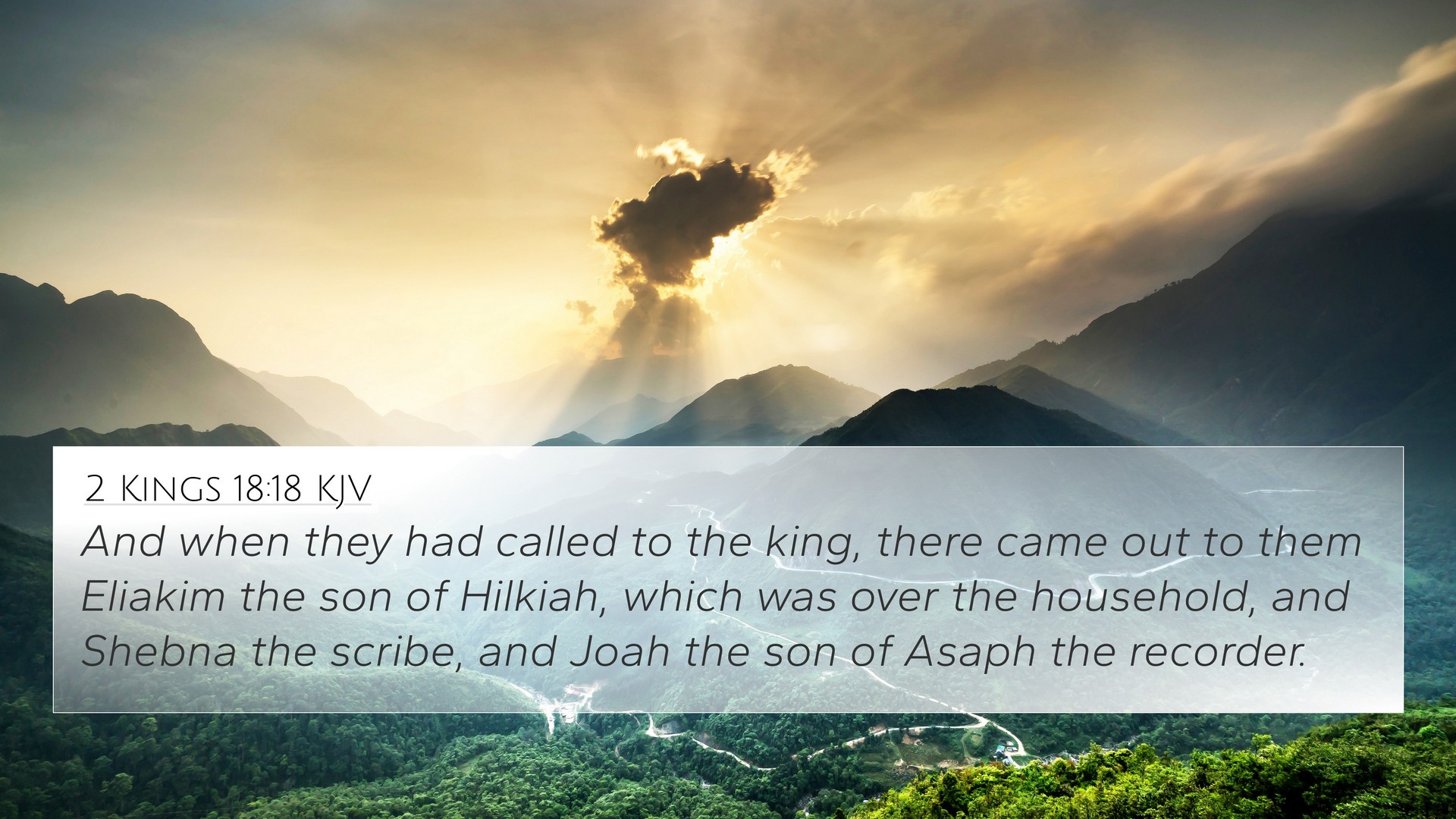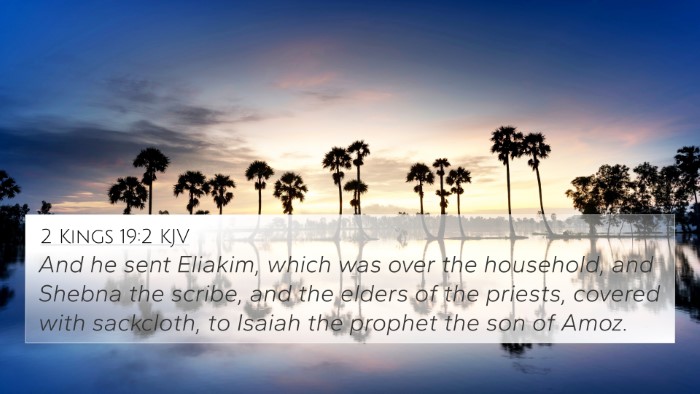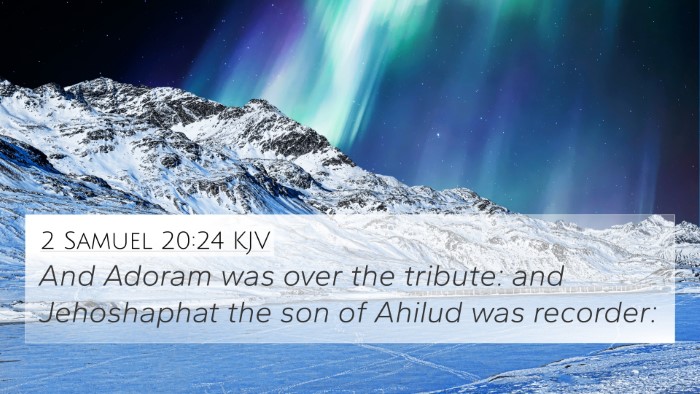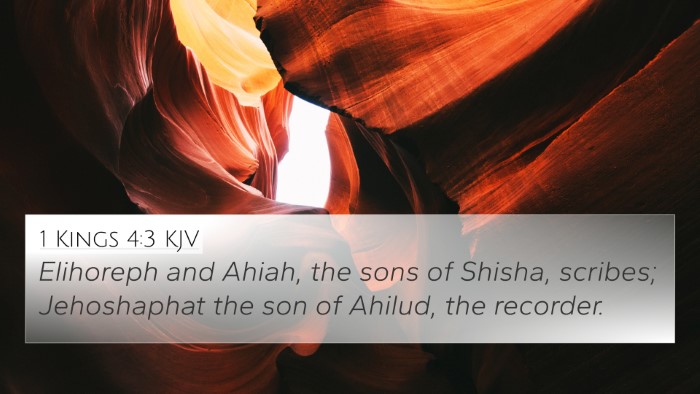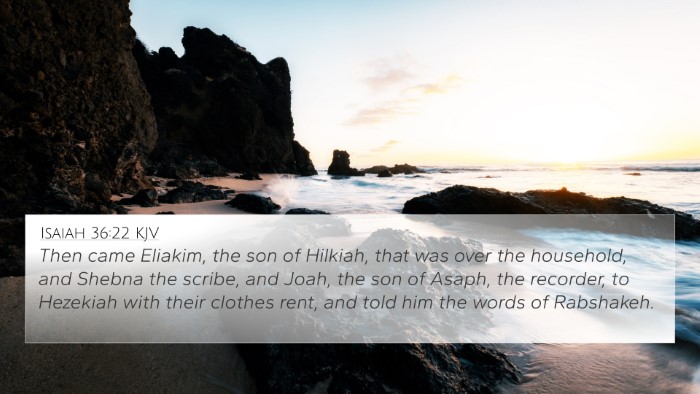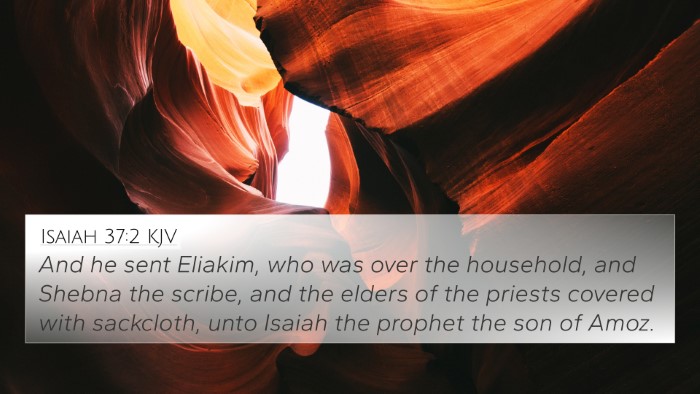Understanding 2 Kings 18:18
Verse: "And when they had called to the king, there came out to them Eliakim the son of Hilkiah, which was over the household, and Shebna the scribe, and Joah the son of Asaph, the recorder." (2 Kings 18:18)
Overview of 2 Kings 18:18
This verse is situated within a larger narrative concerning the Assyrian siege of Jerusalem and the response of King Hezekiah’s administration. Here, we see key figures engaging with representatives sent by the Assyrian king, Sennacherib, which plays a significant role in the unfolding events. Understanding this verse requires us to examine its historical, thematic, and prophetic implications.
Commentary Insights
Matthew Henry's Commentary
Henry emphasizes the characters involved in this verse, particularly Eliakim, who is portrayed as a significant authority in King Hezekiah's court. Eliakim's role is depicted as that of a steward over the king's house, which indicates his trusted position. The mention of Shebna the scribe points towards the administrative responsibilities prevalent during this period. Henry notes the importance of these figures in the context of Assyrian threats and the impending crisis, suggesting that God’s providence is reflected in their involvement.
Albert Barnes' Notes
Barnes points out the continuity of leadership and the strategic importance of these officials during a time of uncertainty. His commentary highlights the alliance of the king’s advisors symbolizing unity and resolve in facing adversaries. Furthermore, Barnes notes that the roles occupied by Eliakim, Shebna, and Joah were crucial for maintaining order and communication during the siege, reflecting the overarching theme of reliance on God and wise counsel during distressing times.
Adam Clarke's Commentary
Clarke provides insight into the symbolic meanings behind the names of these leaders. He notes that Eliakim means "God will raise up," suggesting divine support in grave situations. The function of the scribe, represented by Shebna, is discussed in terms of the importance of documenting and communicating royal decrees and responses effectively. Clarke further delves into the importance of a united front against encroaching threats, enforcing the idea that spiritual and political leadership must work together for the nation’s survival.
Theological Themes
Across these commentaries, several themes emerge:
- Leadership and Authority: The significance of godly leadership in a time of crisis is profound. The verse reflects a need for wise counsel and strategic governance.
- Divine Providence: God’s hand in historical events is a recurrent notion, highlighting how He raises leaders to guide His people.
- Unity in Leadership: The cooperative efforts of Eliakim, Shebna, and Joah emphasize a collective approach to crisis management, rooted in trust and dependence on divine guidance.
Related Bible Verse Cross-References
This verse relates to several others throughout Scripture that enhance our understanding of leadership, crisis management, and divine intervention:
- Isaiah 36:3: This verse further outlines the roles of Eliakim and Shebna as they face the Assyrian threat.
- 2 Chronicles 32:3-4: Discusses the preparations made by King Hezekiah against the Assyrians, showing the importance of wise counsel.
- Proverbs 11:14: Emphasizes that in the abundance of counselors, there is safety.
- Isaiah 7:2: References fear gripping the people of Judah in the face of conflict, paralleling the situation faced by Hezekiah.
- Exodus 18:21-22: This passage discusses selecting capable leaders as a means of effective governance.
- Psalm 118:6: Reflects on trusting the LORD rather than fearing man, pertinent to the situation in 2 Kings 18.
- Jeremiah 23:4: Speaks to the importance of good leaders raised by God during trying times.
Further Study and Reflection
For those interested in deeper study, the following keywords might guide additional research:
- Bible verse cross-references
- Connections between Bible verses
- Comparative Bible verse analysis
- Bible verses related to leadership and crisis
Understanding 2 Kings 18:18 invites reflection on the nature of godly leadership and how individuals can seek divine wisdom in their personal lives today. This verse serves not only as a historical reference but as an enduring principle applicable for contemporary believers in navigating crises and reaffirming faith in God's providence.
Conclusion
2 Kings 18:18 provides a rich context for understanding godly leadership amidst adversity. The insights from the commentaries of Matthew Henry, Albert Barnes, and Adam Clarke, alongside the numerous scriptural cross-references, paint a comprehensive picture of the importance of wise counsel, unity, and divine guidance in the face of trials. Believers are challenged to reflect on how these themes manifest in their own lives and communities.
